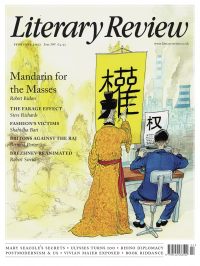Donald Rayfield
Editor-in-Chief of the USSR
Stalin’s Library: A Dictator and His Books
By Geoffrey Roberts
Yale University Press 272pp £25
In chapter seven of Pushkin’s Eugene Onegin, the disillusioned Tatiana inspects the books in Onegin’s abandoned library. She finds ‘marks of his pencil on their margins. Everywhere Onegin’s soul can’t help expressing itself with a short word, a cross, or a question mark.’ Tatiana ends up wondering about the real character of the man she adored. Geoffrey Roberts has undertaken a similar inspection of the few hundred books that have survived of the 25,000 or so that Stalin owned, which have been kept by a Moscow archive because of Stalin’s annotations. Roberts remains, however, more impressed by Stalin than Tatiana was by Onegin. Certainly, Stalin gave himself away in marginalia, which were meant for nobody’s eyes but his own, but we are dealing with a soul far more cryptic and alien than Pushkin’s intelligent but vacuous dandy. Interpreting the reasons for Stalin’s reactions, usually negative, to what he was reading, and assessing the influence of his reading on his decision-making are tasks that demand not just the encyclopedic knowledge that Roberts has of his subject but also the intuition of a psychologist of genius.
The book starts with the surprising assertion that ‘Stalin was no psychopath

Sign Up to our newsletter
Receive free articles, highlights from the archive, news, details of prizes, and much more.@Lit_Review
Follow Literary Review on Twitter
Twitter Feed
Few writers have been so eagerly mythologised as Katherine Mansfield. The short, brilliant life, the doomed love affairs, the sickly genius have together blurred the woman behind the work.
Sophie Oliver looks to Mansfield's stories for answers.
Sophie Oliver - Restless Soul
Sophie Oliver: Restless Soul - Katherine Mansfield: A Hidden Life by Gerri Kimber
literaryreview.co.uk
Literary Review is seeking an editorial intern.
Though Jean-Michel Basquiat was a sensation in his lifetime, it was thirty years after his death that one of his pieces fetched a record price of $110.5 million.
Stephen Smith explores the artist's starry afterlife.
Stephen Smith - Paint Fast, Die Young
Stephen Smith: Paint Fast, Die Young - Jean-Michel Basquiat: The Making of an Icon by Doug Woodham
literaryreview.co.uk